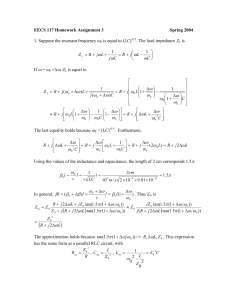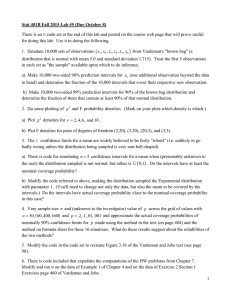MATH 152, Exam I, Version B Spring, 1995 NAME ID#
advertisement
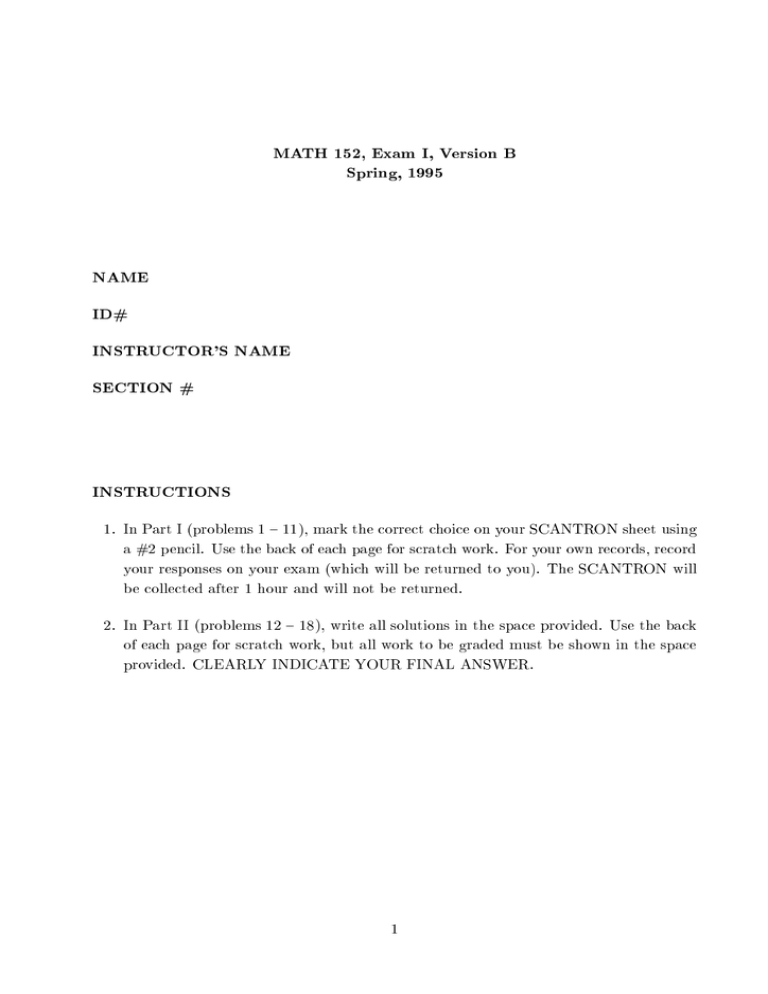
MATH 152, Exam I, Version B
Spring, 1995
NAME
ID#
INSTRUCTOR'S NAME
SECTION #
INSTRUCTIONS
1. In Part I (problems 1 { 11), mark the correct choice on your SCANTRON sheet using
a #2 pencil. Use the back of each page for scratch work. For your own records, record
your responses on your exam (which will be returned to you). The SCANTRON will
be collected after 1 hour and will not be returned.
2. In Part II (problems 12 { 18), write all solutions in the space provided. Use the back
of each page for scratch work, but all work to be graded must be shown in the space
provided. CLEARLY INDICATE YOUR FINAL ANSWER.
1
MATH 152, Exam I, Version B
Part I. MULTIPLE CHOICE, NO PART CREDIT, NO CALCULATORS
The SCANTRON forms will be collected at the end of 1 hour. (5 points each)
d
[ln(x3 + x)].
1. Find dx
(a) x1 + x2 1+ 1
(b) x4
2.
Z
=6
0
(a) 41
sin3 cos d =
(b) 18
3
3. e[ln(3x) ln(x )] =
(a) 3 x+3 x
(b) 3x
Z p3 1
dx =
4.
x2 + 1
0
(a) 7
(b) 6
2
(c) 3xx3 ++x1
1
(c) 16
x3
(d)
x3
1
+x
1
(d) 32
(c) x32
(c) 5
(d) 3 2x
(d) 4
2
(e) x13 + x1
1
(e) 64
(e) 3 + x
(e) 3
x3
5. cos(sin 1 x) =
p
(a) 1 x2
(b) p 1
1
x2
ln x ln 2 .
6. Determine xlim
!2 x 2
(a) 0
(b) 12
7.
Z
(c) cot x
(c) ln12
p
(e) 1 + x2
(d) tan x
(e) 1
(d) 1
tanh xdx =
(a) ln(cosh x) + C
(b) ln(cosh x) + C
(d) csch x + C
2
2
8. If f (x) = e(x ) , then f 0 (3) =
(a) 6e8
(b) 9e8
(c) e9
3
(e) sech x + C
2
(d) 6e9
(c) coth x + C
(e) e6
9. Given:
4 f 0(1) = 3 f 0 (2) = 6
If g(x) is the inverse function of f (x), what is g0(2)?
(b) 13
(c) 41
(d) 51
(a) 12
10.
Z
1
f (1) = 2
2 + 3 dx =
(a) tan (2)
1
11.
1
0
(a) e2
(e) 16
x
x2
0
Z
f (2) =
1
(c) 4 ln 35
(b) tan (5)
1
(d) 41 ln 5
(e) 12 ln 5
xe2x dx =
2
(b) e2
2
(c) e4
(d)
4
e2 + 1
4
(e)
e2
2
1
Part II. WORK OUT PROBLEMS, PART CREDIT will be given. CALCULATORS
ARE PERMITTED after the SCANTRONS are collected.
Show all relevant steps in your solution. Clearly indicated your answer. Unsupported
answers will not be given credit. Only work shown in the space provided will be graded.
12. (6 points) $1000 is invested in an account earning 4% interest compounded continuously. How long does it take this investment to triple? Give your answer (in years) to two
places after the decimal point.
13. (7 points) Evaluate
Z
3
2
x2
1
1 dx.
5
p
14. (6 points) Find the area under the curve y = 4
to x = 2.
x2 ,
above the x-axis, from x = 1
15. (7 points) The velocity of a rocket (in feet per second) is measured at two (2) second
intervals and recorded in the following chart. Use the trapezoid rule to approximate the
distance the rocket travelled from t = 0 to t = 8.
time
0 2
4
6
8
velocity
0 5 12 30 70
sin x .
16. (7 points) Find xlim
x
!0 e 1 x
2
6
17. (6 points) Find a continuous function f (x) so that
Z
x
0
f (t)dt = 2f (x)
3.
Z
b
18. (6 points) In using Simpson's rule with n intervals to approximate f (x)dx, the
a
M (b a)5
error is at most 180n4 , where jf (4)(x)j M for a x b. Using this estimate, what
Z3
integer n should you use to guarantee that the Simpson's rule approximation to ln(x)dx
1
6
is within 10 of the exact answer?
7
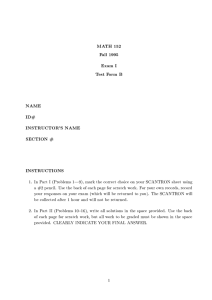
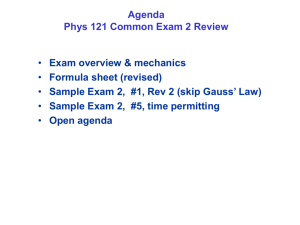
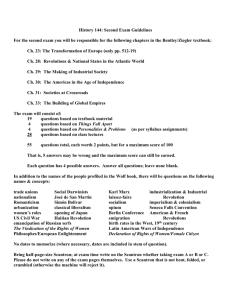
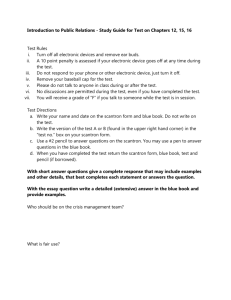
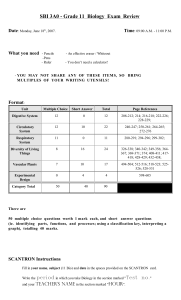

![1S3 (Timoney) Tutorial/Exercise sheet 9 Name: [Tutorials April 2 – 13, 2007]](http://s2.studylib.net/store/data/010571887_1-77de9ea88fb9efbd3fc69b51cb19b535-300x300.png)
